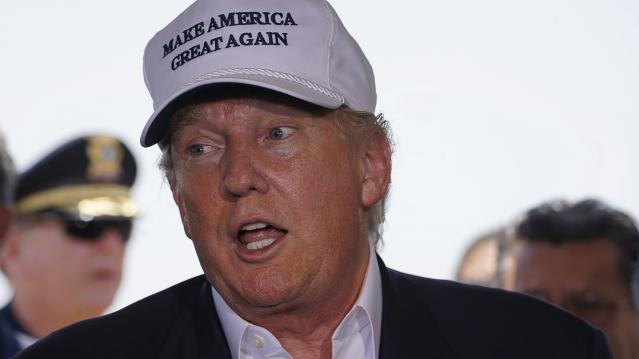Trump’s ‘Make America Great Again’ Hat Is Already Sold Out

Maybe it’s just another lesson in the art of the deal.
Donald Trump had the Internet flipping out — again — on his visit to the Mexican border last week by covering his signature orange coif with an ill-fitting white cap emblazoned with his campaign slogan, “Make America Great Again” — a slogan made famous by Ronald Reagan but recently trademarked by Trump.
Related: Trump Just Showed Why His Campaign Is Doomed
While Trump’s campaign website doesn’t yet have a store, the hats quickly went on sale at Trump Tower in midtown Manhattan, a destination for tourists and some Fifth Avenue shoppers. The hats are available for $20 in a choice of red, blue or the white version Trump wore.
Or make that were available. As of Monday, the initial order of the Republican presidential candidate’s caps were sold out. A salesperson said the store expected to have them back in stock by the end of the week. In the meantime, the store still had plenty of $15 “Make America Great Again” t-shirts for sale. And if you’re really desperate to get your hands on Trump’s new lid, there are plenty of knockoffs popping up online.
Top Reads From The Fiscal Times:
- Donald Trump Just Showed Why His Campaign Is Doomed
- Bernie Won’t Be President, but He’s Still Bad News for the GOP
- Donnybrook in the Senate as Cruz Takes On McConnell
Deficit Hits $738.6 Billion in First 8 Months of Fiscal Year

The U.S. budget deficit grew to $738.6 billion in the first eight months of the current fiscal year – an increase of $206 billion, or 38.8%, over the deficit recorded during the same period a year earlier. Bloomberg’s Sarah McGregor notes that the big increase occurred despite a jump in tariff revenues, which have nearly doubled to $44.9 billion so far this fiscal year. But that increase, which contributed to an overall increase in revenues of 2.3%, was not enough to make up for the reduced revenues from the Republican tax cuts and a 9.3% increase in government spending.
Tweet of the Day: Revenues or Spending?

Rep. Kevin Brady (R-TX), ranking member of the House Ways and Means Committee and one of the authors of the 2017 Republican tax overhaul, told The Washington Post’s Heather Long Tuesday that the budget deficit is driven by excess spending, not a shortfall in revenues in the wake of the tax cuts. The Wall Street Journal’s Kate Davidson provided some inconvenient facts for Brady’s claim in a tweet, pointing out that government revenues as a share of GDP have fallen significantly since 2015, while spending has remained more or less constant.
Chart of the Day: The Decline in IRS Audits

Reviewing the recent annual report on tax statistics from the IRS, Robert Weinberger of the Tax Policy Center says it “tells a story of shrinking staff, fewer audits, and less customer service.” The agency had 22% fewer personnel in 2018 than it did in 2010, and its enforcement budget has fallen by nearly $1 billion, Weinberger writes. One obvious effect of the budget cuts has been a sharp reduction in the number of audits the agency has performed annually, which you can see in the chart below.
Number of the Day: $102 Million

President Trump’s golf playing has cost taxpayers $102 million in extra travel and security expenses, according to an analysis by the left-leaning HuffPost news site.
“The $102 million total to date spent on Trump’s presidential golfing represents 255 times the annual presidential salary he volunteered not to take. It is more than three times the cost of special counsel Robert Mueller’s investigation that Trump continually complains about. It would fund for six years the Special Olympics program that Trump’s proposed budget had originally cut to save money,” HuffPost’s S.V. Date writes.
Date says the White House did not respond to HuffPost’s requests for comment.
Americans See Tax-Paying as a Duty

The IRS may not be conducting audits like it used to, but according to the agency’s Data Book for 2018, most Americans still believe it’s not acceptable to cheat on your taxes. About 67% of respondents to an IRS opinion survey “completely agree” that it’s a civic duty to pay “a fair share of taxes,” and another 26% “mostly agree,” bringing the total in agreement to over 90%. Accounting Today says that attitude has been pretty consistent over the last decade.



